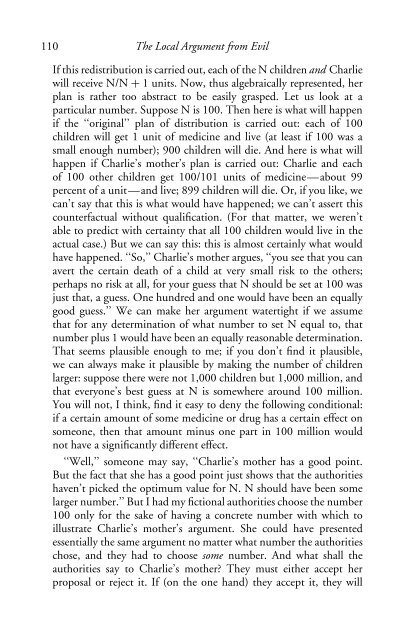The Problem of Evil - Common Sense Atheism
The Problem of Evil - Common Sense Atheism
The Problem of Evil - Common Sense Atheism
You also want an ePaper? Increase the reach of your titles
YUMPU automatically turns print PDFs into web optimized ePapers that Google loves.
110 <strong>The</strong> Local Argument from <strong>Evil</strong><br />
If this redistribution is carried out, each <strong>of</strong> the N children and Charlie<br />
will receive N/N + 1 units. Now, thus algebraically represented, her<br />
plan is rather too abstract to be easily grasped. Let us look at a<br />
particular number. Suppose N is 100. <strong>The</strong>n here is what will happen<br />
if the ‘‘original’’ plan <strong>of</strong> distribution is carried out: each <strong>of</strong> 100<br />
children will get 1 unit <strong>of</strong> medicine and live (at least if 100 was a<br />
small enough number); 900 children will die. And here is what will<br />
happen if Charlie’s mother’s plan is carried out: Charlie and each<br />
<strong>of</strong> 100 other children get 100/101 units <strong>of</strong> medicine—about 99<br />
percent <strong>of</strong> a unit—and live; 899 children will die. Or, if you like, we<br />
can’t say that this is what would have happened; we can’t assert this<br />
counterfactual without qualification. (For that matter, we weren’t<br />
able to predict with certainty that all 100 children would live in the<br />
actual case.) But we can say this: this is almost certainly what would<br />
have happened. ‘‘So,’’ Charlie’s mother argues, ‘‘you see that you can<br />
avert the certain death <strong>of</strong> a child at very small risk to the others;<br />
perhaps no risk at all, for your guess that N should be set at 100 was<br />
just that, a guess. One hundred and one would have been an equally<br />
good guess.’’ We can make her argument watertight if we assume<br />
that for any determination <strong>of</strong> what number to set N equal to, that<br />
number plus 1 would have been an equally reasonable determination.<br />
That seems plausible enough to me; if you don’t find it plausible,<br />
we can always make it plausible by making the number <strong>of</strong> children<br />
larger: suppose there were not 1,000 children but 1,000 million, and<br />
that everyone’s best guess at N is somewhere around 100 million.<br />
You will not, I think, find it easy to deny the following conditional:<br />
if a certain amount <strong>of</strong> some medicine or drug has a certain effect on<br />
someone, then that amount minus one part in 100 million would<br />
not have a significantly different effect.<br />
‘‘Well,’’ someone may say, ‘‘Charlie’s mother has a good point.<br />
But the fact that she has a good point just shows that the authorities<br />
haven’t picked the optimum value for N. N should have been some<br />
larger number.’’ But I had my fictional authorities choose the number<br />
100 only for the sake <strong>of</strong> having a concrete number with which to<br />
illustrate Charlie’s mother’s argument. She could have presented<br />
essentially the same argument no matter what number the authorities<br />
chose, and they had to choose some number. And what shall the<br />
authorities say to Charlie’s mother? <strong>The</strong>y must either accept her<br />
proposal or reject it. If (on the one hand) they accept it, they will
















